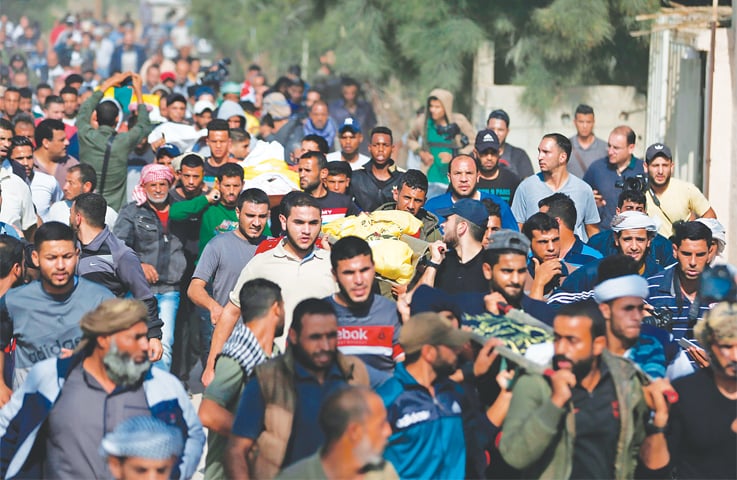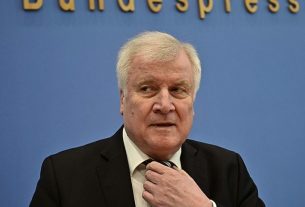GAZA: Palestinian militant group Islamic Jihad and Israel declared a halt to hostilities across the Gaza Strip border on Thursday but a lasting ceasefire appeared tenuous as they differed on terms.
Islamic Jihad said an Egyptian-mediated truce went into effect at 0330 GMT, about 48 hours after Israel triggered the exchange of fire by killing the Iranian-backed faction’s top Gaza commander in an air strike, deeming him an imminent threat.
Occasional rocket fire from Gaza broke the calm that ensued, but the ceasefire largely held as night fell.
Gaza medical officials have put the total death toll from the two days of fighting at 34 Palestinians, almost half of them civilians and including eight children and three women.
Hundreds of rocket launches by militants had paralysed much of southern Israel and reached as far north as Tel Aviv, sending entire communities to shelters. Dozens of Israelis were hurt.
Hamas, Gaza’s dominant faction, appeared to have stayed out of this round of fighting. That may have helped stem escalation.
Israeli Prime Minister Benjamin Netanyahu said the military operation was drawing to a conclusion with its goals met. “Our enemies got the message — we can reach anyone,” Netanyahu said, as he visited soldiers at a missile interception battery.
Islamic Jihad said Israel had accepted its demand to stop both the targeted killing of militants and sometimes lethal army gunfire at weekly Palestinian protests on the Gaza border.
“The ceasefire began under Egyptian sponsorship after the Occupation [Israel] submitted to the conditions set by Islamic Jihad on behalf of Palestinian resistance factions,” Islamic Jihad spokesman Musab Al-Braim said.
But Israel said it would observe only a limited quid pro quo. “Quiet will be answered with quiet,” Foreign Minister Israel Katz told Army Radio.
In the deadliest incident of the two-day hostilities, eight members of a Gaza family were killed by an Israeli missile strike shortly before the truce took hold, said medical officials and residents.
They said all were civilians. But Israeli military spokesman Lieutenant-Colonel Avichay Adraee said the head of the family, Rasmi Abu Malhous, who was among the dead, was the commander of Islamic Jihad rocket crews in the central Gaza Strip.
Neighbours left their homes to help rescue workers pull out the bodies of the family, some of which were completely buried in sandy earth. Civilians tried to test the pulse of one body before pulling it out.
Israel’s allegation about Rasmi Abu Malhous could not immediately be confirmed. Islamic Jihad did not claim him as a member.
Neither the hostilities nor efforts to halt them shifted the dynamics of the underlying core conflict.
While Hamas has been open to long-term truces, like Islamic Jihad it refuses to accept permanent co-existence with Israel.
Katz said there would be no change to Israeli military policy in Gaza, contradicting the assertion of Islamic Jihad.
Targeted killings “will not cease”, he said, and “the open-fire policy for which the Israel Defence Forces is responsible [at the Gaza border] will not change”.
Markets in Gaza reopened as life returned to normal, though people expressed mixed feelings about the truce. “We responded and made clear our blood was not shed in vain. Also a truce is good because we don’t want our people to suffer more under the blockade,” said one resident, Mohammad Al-Smairi.
UN mediator Nickolay Mladenov said the Gaza situation remained fragile, tweeting: “All must show maximum restraint and do their part to prevent bloodshed. The Middle East does not need more wars.”
Iran imposed petrol rationing and raised pump prices by 50 per cent or more on Friday, in a new move to cut costly subsidies that have fuelled high consumption and rampant smuggling.
The Islamic republic provides some of the most heavily subsidised petrol in the world, with the pump price previously standing at just 10,000 rials (less than nine US cents) a litre.
Each driver with a fuel card will now have to pay 15,000 rials (13 US cents) per litre for the first 60 litres of petrol bought each month, the state-run National Iranian Oil Products Distribution Company said. Each additional litre will be charged at 30,000 rials.
Fuel cards were first introduced in 2007 with a view to reforming the subsidies system and curbing large-scale smuggling.
The head of Iran’s Planning and Budget Organisation, Mohmmad Bagher Nobakht, said the proceeds from the price hike will be used to provide additional subsidies for 60 million people in need.
He said President Hassan Rouhani had insisted that “all extra revenues from the petrol price reform should be paid back to the people”.
“The first payments will be handled within the next week or 10 days,” Nobakht told state news agency IRNA.
Ulta-low petrol prices have led to high consumption, with Iran’s 80 million population buying an average of 90 million litres per day, according to state news agency IRNA.
They have also fuelled very high levels of smuggling — estimated at around 10 to 20 million litres per day, IRNA said.
Smuggling has intensified as the rial has plummeted against the dollar since Washington unilaterally abandoned a 2015 nuclear deal with Tehran and reimposed crippling sanctions last year.
Inflation is now running at more than 40 per cent and the International Monetary Fund projects that the troubled economy will contract by 9pc this year and stagnate in 2020.



